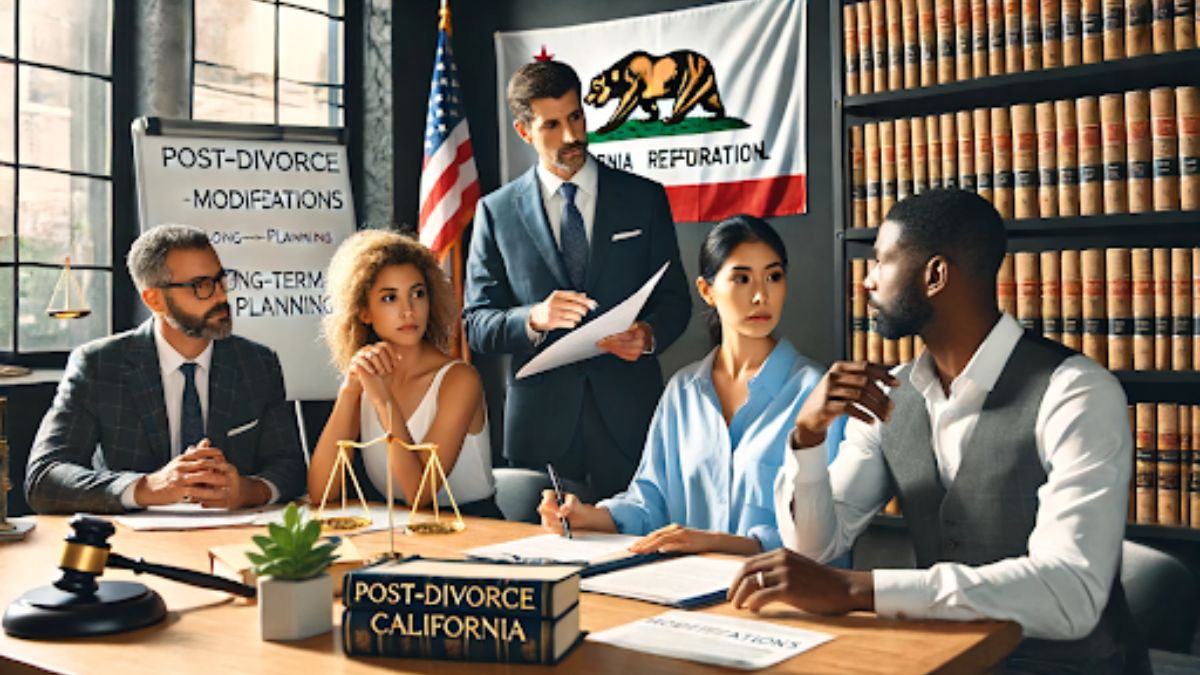LAW
Post-Divorce Considerations in California: Modifications and Long-Term Planning

Navigating post-divorce life in California requires careful consideration of various factors, from child custody and financial stability to future planning. One crucial aspect is understanding the grounds for post-decree modifications, especially when unforeseen circumstances arise that affect compliance with the original divorce terms. Changed financial situations can significantly impact ongoing agreements.
In California, the legal rights of a non-relocating parent play a vital role when post-divorce relocation becomes a consideration. A move, especially over long distances, directly influences existing custody and visitation arrangements, necessitating the involvement of both parents in these decisions. For those seeking to navigate this complex terrain, consulting experienced divorce lawyers can offer crucial assistance.
Long-term planning post-divorce includes understanding potential modifications to alimony and child support due to significant life changes. Legal separation and subsequent modifications in California should be approached with a clear strategy to ensure that all parties’ rights and commitments are respected and maintained. This proactive planning helps in preventing future disputes and ensures a stable transition into post-divorce life.
Understanding Post-Divorce Modifications
Post-divorce modifications in California revolve around changes to child support, alimony, and custody agreements based on significant changes in circumstances. This process requires navigating legal standards and presenting compelling evidence.
Overview of Modifications in Family Law
In family law, modifications refer to changes made to divorce decrees when substantial changes in circumstances occur. California law allows for these adjustments to address evolving needs. The family court holds broad discretion in determining if a modification is justified.
Courts focus on whether the existing order remains fair and applicable. The burden of proof lies with the party requesting the modification, requiring them to present clear evidence of the changed circumstances that necessitate the update.
Types of Modifications and Relevant Considerations
Modifications typically involve child support, alimony, custody, and visitation arrangements. Each type hinges on key factors such as health, education, and age of the involved parties.
Child support and alimony adjustments take into account financial changes or significant life events. Custody modifications consider the best interests of the child, often evaluating the same 14 factors used in initial custody determinations.
For instance, the loss of employment or a significant health issue could warrant a modification of support. These changes must be substantial and unforeseen to convince the court of their necessity.
The Process for Requesting Modifications
Initiating a post-divorce modification in California begins with filing a petition for modification. This legal document, submitted to the court that issued the original order, outlines the requested changes and provides supporting evidence.
The family court reviews the petition and assesses whether the claimed changed circumstances justify the modification. This involves scrutinizing the provided evidence and considering the burden of proof met by the petitioner.
Family law attorneys play a crucial role in navigating this process, helping to articulate the changed circumstances and presenting a compelling case to the court. Prompt action and thorough preparation are essential for a successful modification request.
Navigating Long-Term Planning and Support
Post-divorce life requires careful consideration of financial stability, child custody, and the well-being of all parties involved. Adapting to the new realities involves planning and possibly adjusting legal and financial arrangements over time.
Financial Stability and Spousal Support
In long-term marriages, financial stability often centers around spousal support. According to California family law, a long-term marriage lasts ten years or more. Such marriages may result in permanent support where the lower-earning spouse receives payments indefinitely.
Support amounts are determined by guidelines that consider the marital standard of living and the earning capacities of both parties. If circumstances like job loss or career advancement arise, adjustments in support payments may be necessary. Engaging a divorce attorney for expert guidance can help navigate these changes. Open communication with an ex-spouse and careful management of financial documents can ensure continued stability.
Child Custody, Visitation, and Parental Obligations
Child custody and visitation heavily impact the child’s best interest. Custody agreements and visitation arrangements should foster a stable and supportive environment. Relocation or significant lifestyle changes by either parent can necessitate custody modifications.
Factors such as cohabitation or remarriage may influence these arrangements. In some cases, especially involving domestic violence, legal protection measures and mediation could be required. Maintaining open communication and putting the child’s needs first are crucial. Regular reviews and necessary adjustments can help uphold the child’s welfare.
Adjusting to Life Post-Divorce and Maintaining Well-Being
Adapting to post-divorce life involves addressing both financial and emotional needs. Budgeting and financial planning are essential to manage expenses and debt. Building or upgrading job skills can increase earning potential and align with career advancement opportunities. Seeking a free consultation with financial planners can help create a realistic long-term strategy.
Maintaining overall well-being involves rebuilding social connections and possibly seeking therapy. Support systems like family and friends or professional counselors contribute to a healthier adjustment period. It’s important to address these aspects to sustain a balanced and fulfilling lifestyle post-divorce.
Legal and Financial Implications of Changes
Changes in financial circumstances or the need for legal modifications are common. Revisiting financial documents and potentially modifying terms with legal assistance can ensure fair outcomes. Permanent support might need reevaluation if there are significant shifts in income levels or remarriage status.
Relocation can have substantial legal and financial implications. Laws in California require consideration of both parents’ rights and the child’s best interests in such scenarios. Keeping up to date with California family law and obtaining expert guidance ensures compliance and informed decision-making.
In Conclusion
Navigating post-divorce life in California involves understanding potential modifications and long-term planning. Factors like changed financial circumstances, child custody, and spousal support often necessitate adjustments.
Legal Modifications:
- Post-judgment modifications affect the finalized divorce decree.
- Significant changes in financial status may require new alimony or child support agreements.
Long-Term Support:
- Long-term spousal support aims to help maintain financial stability.
- It incorporates various factors to determine support duration and amount.
Petitioning for Changes:
- Formal requests must be filed to modify divorce terms.
- Legal advice may be crucial for navigating this process.
Flexibility and readiness are key to managing unforeseen changes in life post-divorce. Maintaining open communication and being prepared for possible legal modifications can help ensure long-term stability.
LAW
Why You Should Hire a Fairfax Criminal Defense Lawyer for Juvenile Cases

When it comes to juvenile criminal cases, the stakes are high. For parents or guardians, seeing a child face criminal charges can be overwhelming, and the legal process might feel intimidating. That is why hiring an experienced Fairfax criminal defense lawyer is crucial. Suppose you deal with legal matters in Fairfax or nearby areas like Leesburg. In that case, it’s also essential to consider the assistance of a Leesburg criminal defense lawyer.
Juvenile cases require special attention because the legal system focuses on rehabilitation rather than punishment. A Fairfax or Leesburg criminal defense lawyer specializing in juvenile cases can navigate the court’s complexities and advocate for the best possible outcome for the child. Without proper legal representation, a young person’s future could be significantly impacted by a criminal record, even in cases involving minor offenses.
Understanding the Juvenile Justice System
The juvenile justice system is designed to be distinct from the adult criminal system, focusing more on rehabilitation and less on punishment. The idea is to help young offenders correct their behavior rather than condemn them to a life of crime. However, navigating this system requires a deep understanding of its intricacies, so hiring a criminal defense lawyer in Fairfax or Leesburg is critical.
Juvenile cases can include a range of offenses, from minor infractions like shoplifting to more serious crimes like assault or drug possession.
A qualified Fairfax criminal defense lawyer can help ensure that your child’s case is handled appropriately and that they are treated fairly throughout the process. They can also work to keep the case in juvenile court rather than allowing it to escalate to adult court, where penalties are often harsher.
Why Hire a Criminal Defense Lawyer for Juvenile Cases?
- Expert Knowledge of Juvenile Law: Juvenile law is complex and distinct from adult criminal law. Not all lawyers are equipped to handle the nuances involved in these cases. A seasoned criminal defense lawyer in Fairfax or Leesburg understands the laws specific to juvenile cases, as well as the procedures and tendencies of local courts.
- Focus on Rehabilitation, Not Punishment: The juvenile justice system focuses on helping young offenders improve their behavior instead of punishing them. A good defense lawyer will work to ensure that the court focuses on rehabilitation options such as counseling, community service, or diversion programs rather than imposing harsh penalties. They can negotiate with the court to reduce charges or avoid detention in a juvenile facility, helping the child get the support they need to reform their behavior.
- Protection of the Child’s Rights: Many people, especially minors, may need to understand their rights within the legal system fully. An experienced Leesburg criminal defense lawyer or Fairfax criminal defense lawyer will protect the child’s rights throughout the legal proceedings. It includes protecting them from coercive interrogation tactics, ensuring fair treatment, and preventing any violations of their legal rights that could compromise their case.
- Reducing Long-Term Consequences: Even though juvenile records are often sealed or expunged, a criminal charge can have long-term consequences for a young person. It could affect their ability to get into college, secure a job, or qualify for scholarships and loans. In some cases, they may be able to get the case dismissed entirely.
- Avoiding Transfer to Adult Court: One of the most significant risks in juvenile cases is the possibility of the child being transferred to adult court. If this happens, the penalties can be far more severe, and the child could face prison time. A qualified Fairfax criminal defense lawyer can fight to keep the case in juvenile court, where the focus remains on rehabilitation. In Virginia, courts can try minors as adults for certain serious crimes. Still, a skilled lawyer can present arguments to prevent this transfer.
The Benefits of Local Knowledge
Hiring a local criminal defense lawyer in Fairfax or Leesburg provides a significant advantage. These lawyers are familiar with the local courts, judges, and prosecutors, which means they can better predict how a case might unfold. They can also leverage their local connections to negotiate more favorable outcomes.
For example, a Fairfax criminal defense lawyer who regularly handles juvenile cases in Fairfax courts will know the tendencies of specific judges regarding sentencing or rehabilitation programs.
Personalized Attention and Compassion
Juvenile cases often involve highly emotional and stressful circumstances for both the child and their family. A good defense lawyer doesn’t just focus on the legal aspects of the case; they also provide emotional support and guidance throughout the process. A compassionate Fairfax criminal defense lawyer will listen to your concerns and answer your questions.
Parents may feel helpless and unsure of what steps to take next when their child faces criminal charges. Having a lawyer who takes the time to explain the legal process and provides reassurance can make a world of difference.
Conclusion
Juvenile criminal cases require specialized legal representation, and hiring a Fairfax criminal defense lawyer or a Leesburg criminal defense lawyer can make all the difference in your child’s case. These lawyers know the local laws and how to handle the juvenile justice system, ensuring the child’s rights are protected, and the court focuses on helping them improve. Hiring a qualified lawyer safeguards your child’s immediate future. It helps them avoid long-term consequences that could impact their lives.
LAW
Motorcycle Accident Law: Key Things You Should Know

Motorcycle enthusiasts in Colorado revel in the state’s expansive landscapes and vast network of scenic roads that make it an ideal place for riding. However, the thrill of motorcycling in such an environment comes with significant risks, and accidents can happen, often with serious consequences. Understanding the intricacies of motorcycle accident law in Colorado is crucial for every rider. Whether you’re navigating the bustling streets of Denver or cruising through the winding roads of the Rockies, knowing your legal rights and how to protect yourself can make all the difference in the event of an accident.
Determining Fault in Motorcycle Accidents
Determining who is at fault in a motorcycle accident is crucial as it influences the outcome of legal claims and compensation. Fault is typically established through the collection of evidence, including police reports, witness statements, and traffic surveillance footage. In some cases, fault may be shared between parties, known as comparative negligence, which can affect the amount of compensation each party receives. Motorcyclists should gather as much evidence as possible immediately after an accident, as this information will be vital in building a strong legal case or defense.
Understanding Motorcycle Accident Law
Motorcycle accident law covers the legal rules and procedures that apply when a motorcycle accident occurs. This law aims to determine who is at fault, assess damages, and award compensation to those injured. In cases where the legalities become complex, assistance from a motorcycle injury law firm in Denver can be invaluable. These firms specialize in understanding local laws and can help victims navigate the claims process to ensure they receive the compensation they deserve. They also provide representation in court if the claim escalates into a legal dispute.
Common Causes of Motorcycle Accidents
The causes of motorcycle accidents can vary widely, but some common factors include driver negligence, such as speeding or distracted driving, and environmental conditions like slippery roads or poor visibility. Other drivers’ failure to see motorcycles due to their smaller size also frequently contributes to accidents. Legally, these factors play a crucial role as they help establish fault or liability in a crash. Understanding these common causes can help motorcyclists be more vigilant and potentially prevent accidents before they occur.
The Role of Insurance
Insurance plays a pivotal role in dealing with the aftermath of a motorcycle accident. Motorcyclists should have a clear understanding of their insurance policy’s coverage, including what damages it covers and any limitations or exclusions that may apply. Dealing with insurance companies can be challenging, often requiring careful negotiation to get the rightful compensation. Riders should document all communications with their insurance provider and consider seeking legal advice to ensure their rights are fully protected and to facilitate the claims process.
Legal Rights of Motorcyclists
Motorcyclists have specific legal rights that protect them before, during, and after an accident. These rights ensure they can claim compensation for injuries and damages if they are not at fault. They also provide protection against unfair practices by insurance companies and other parties involved in the accident. It is important for riders to know these rights thoroughly to defend themselves effectively in any legal battles and to secure fair treatment and compensation. Educating oneself about these rights can significantly impact the outcomes of legal proceedings and insurance claims.
Compensation for Motorcycle Accidents
Understanding the types of compensation available after a motorcycle accident is crucial for any rider. Victims may be entitled to recover costs for medical expenses, lost wages due to time away from work, and compensation for pain and suffering. In some cases, if the injury leads to long-term disability, compensation might also cover ongoing rehabilitation costs and modifications needed for a changed lifestyle. Knowing what can be claimed and how to document these expenses is vital for ensuring that you receive full compensation. It’s important to work with knowledgeable attorneys who can help accurately assess and demand appropriate compensation for all damages.
Steps to Take After a Motorcycle Accident
The steps taken immediately following a motorcycle accident can significantly impact the outcome of legal and insurance claims. First and foremost, ensure safety at the scene: move to a safe area, check for injuries, and call emergency services. It is crucial to document the accident scene with photos and gather contact information from witnesses. Filing a police report and notifying your insurance company as soon as possible are also key actions. Having a structured approach to handling the aftermath of an accident can streamline the process of filing for compensation.
Choosing the Right Attorney
Selecting the right attorney is essential for navigating the complexities of motorcycle accident law. Look for a lawyer who specializes in motorcycle accidents as they will have specific knowledge and experience that can greatly benefit your case. During initial consultations, assess the attorney’s understanding of local laws, their approach to handling cases, and their track record of success in similar cases. A competent attorney will not only offer legal guidance but also advocate on your behalf, striving to secure the best possible outcome for your situation.
Preventing Motorcycle Accidents
Prevention is always better than cure, especially when it comes to motorcycle accidents. Riders can take proactive steps to reduce the risk of accidents by maintaining their motorcycles in good working order, wearing appropriate safety gear, and adhering to road safety laws. Continuous education about safe riding practices and staying updated on new laws can also help reduce accident risks. Participating in defensive riding courses can enhance riding skills and strategies for avoiding accidents.
Legal Trends and Recent Case Studies
Staying informed about recent legal trends and case studies related to motorcycle accidents can provide valuable insights for riders. Understanding how similar cases have been handled in the courts can inform your decisions regarding your own case. It also helps in understanding how legal standards and interpretations are evolving, which can directly impact your rights as a motorcyclist.
Motorcycle riding in Colorado comes with its share of risks, but with the right knowledge and preparation, riders can protect themselves legally and financially. From knowing how to handle the immediate aftermath of an accident to choosing the right legal representation and understanding your compensation rights, being well-prepared can make a significant difference. Stay informed, stay safe, and ensure you have the necessary legal knowledge to protect your interests in the event of an accident.
LAW
Empowering Consumers: A Guide to Effective Pharmaceutical Research

In today’s healthcare landscape, being an informed consumer is more important than ever. With countless pharmaceuticals available, consumers often find it overwhelming to determine which medications are both safe and effective. The rise of misinformation can lead to dangerous health decisions, impacting individual health and undermining public trust in the healthcare system. It is crucial for consumers to take the initiative to research and understand the products they are using. By doing so, they can make informed choices that not only protect their well-being but also empower them to engage in meaningful conversations with healthcare providers. Ultimately, an educated consumer contributes to a more transparent and accountable healthcare environment.
Misinformation can take many forms, from exaggerated marketing claims to misleading testimonials. This prevalence underscores the necessity for consumers to critically evaluate pharmaceutical products and the claims surrounding them. A well-informed consumer is better equipped to navigate the complexities of medications, leading to healthier choices and improved health outcomes. Additionally, understanding the sources of information—whether peer-reviewed studies or anecdotal experiences—can further enhance a consumer’s ability to discern fact from fiction. Therefore, mastering effective research techniques is essential for anyone looking to manage their health wisely and make choices that align with their personal health goals.
Understanding Pharmaceutical Claims
Pharmaceutical claims refer to the statements made by drug manufacturers regarding the effectiveness and safety of their products. These claims can range dramatically, from assertions of immediate relief to promises of long-term health benefits. While some claims are firmly rooted in scientific research, others may be misleading or exaggerated, aimed primarily at attracting consumers. Understanding the nature of these claims is crucial, as they can significantly influence your healthcare decisions and impact your overall health journey. By becoming familiar with the terminology and regulatory standards, consumers can better navigate the often complex landscape of pharmaceutical marketing, leading to more confident and informed choices.
Recognizing the difference between legitimate claims and misleading information is vital for making informed decisions. Legitimate claims are typically backed by rigorous clinical trials and peer-reviewed studies, while misleading claims often depend on anecdotal evidence or lack substantial scientific support. By scrutinizing these claims, consumers can make better choices about which medications to trust and use. This careful examination not only enhances individual health outcomes but also fosters a culture that prioritizes transparency and honesty in healthcare. Empowered consumers can challenge misleading practices and advocate for higher standards in pharmaceutical marketing, ultimately leading to a more informed public that demands accountability from the industry.
Where to Begin Your Research on Pharmaceuticals
Starting your research can seem overwhelming, but there are reputable sources available to guide you. One of the best places to begin is the FDA website, which provides detailed information about approved medications, including their intended uses, side effects, and clinical trial results. This official resource also offers updates on drug recalls and safety warnings, ensuring you stay informed about potential risks. Peer-reviewed medical journals are another excellent resource, as they contain studies that assess the effectiveness and safety of various pharmaceuticals. By examining these studies, you can gain a deeper understanding of how medications perform in real-world settings. Trusted health organizations also publish valuable information that can help consumers make informed decisions about their medications, often breaking down complex medical jargon into understandable terms for the general public.
If you encounter any suspicious claims during your research, consulting with a Washington DC whistleblower attorney can be beneficial. These legal experts can provide insights into potential fraud and guide you on how to approach your concerns. Their expertise can be particularly valuable in understanding the legal implications of reporting unethical practices. Understanding your legal options can empower you to take action if you suspect wrongdoing, further enhancing your ability to protect your health. Additionally, knowing the right channels for reporting can help ensure your concerns are taken seriously. Taking proactive steps can not only safeguard your health but also contribute to a broader effort to maintain integrity in the pharmaceutical industry.
Recognizing Red Flags in Pharmaceutical Marketing
When evaluating pharmaceutical products, being aware of common red flags is essential. One significant warning sign is overly aggressive marketing tactics. If a product is marketed with extreme enthusiasm or promises that seem too good to be true, it may not be reliable. Additionally, claims lacking scientific backing are often a cause for concern. Advertisements that use flashy slogans or emotional appeals instead of factual evidence should be approached with caution. Taking the time to investigate the claims can prevent costly and potentially harmful health decisions. Always remember that skepticism can be a healthy part of making informed choices, allowing you to navigate the pharmaceutical landscape more effectively.
Another red flag to watch for is the presence of testimonials without credible sources. While personal stories can be compelling, they do not replace rigorous scientific research. Testimonials can often be cherry-picked to highlight only the most favorable outcomes, leaving out negative experiences. If you suspect that a pharmaceutical product is making misleading claims, it is vital to take action. You can report respiratory fraud and other dubious practices to the relevant authorities. By doing so, you ensure that your concerns are addressed and contribute to a safer healthcare environment. Your vigilance can help protect not only your own health but also that of others in your community, fostering a more informed public discourse about medication safety.
Engaging with Healthcare Professionals
Interacting with your healthcare provider is a vital step in taking control of your health. When discussing medications or treatments, it’s important to ask questions. Inquire about the effectiveness of a prescribed drug, potential side effects, and any alternative options that might be available. Don’t hesitate to bring up any personal health concerns that could affect your treatment plan. Understanding the rationale behind a specific medication can also enhance your comfort and compliance with the prescribed regimen. Remember, your health is a partnership, and open communication fosters a better relationship with your provider. By being proactive, you can work together to create a tailored healthcare strategy that best meets your needs.
Additionally, don’t hesitate to voice any concerns you have about pharmaceutical claims. Healthcare providers often stay updated on the latest research and can help you navigate complex information. They can clarify any misconceptions and provide context to the claims you may encounter in advertisements. Engaging in a dialogue about your concerns can also lead to more personalized care, as providers may consider your unique perspective and experiences. If they suspect any fraudulent activities related to a medication or treatment, they may suggest seeking further legal advice. Being vigilant about these issues not only protects your health but also contributes to broader efforts to ensure patient safety and ethical practices within the healthcare system. This proactive approach ensures you are well-informed and supported in your healthcare decisions.
Utilizing Online Tools and Resources
In today’s digital age, numerous online tools and resources can help consumers verify pharmaceutical information. Drug interaction checkers are particularly useful for understanding how different medications may affect each other, helping you make informed decisions about your prescriptions. Additionally, online pharmacy reviews can provide insights into the reliability and safety of various pharmacies, allowing you to choose wisely where to obtain your medications. By cross-referencing multiple sources, you can gain a comprehensive view of the medications you’re considering. This thorough approach can significantly reduce the risk of adverse effects and enhance your overall health management. Staying informed also fosters a proactive attitude toward your health, encouraging open dialogue with your healthcare provider.
Patient forums and support groups also serve as excellent resources for gathering information about medications and treatments. Hearing from others who have had similar experiences can offer valuable perspectives. If you encounter fraudulent claims while using these online resources, remember that you can consult a whistleblower law firm for advice. They can help you navigate the process of reporting any concerns you may have, ensuring that your actions contribute to a safer healthcare environment. Engaging in these communities not only provides support but can also empower you to advocate for better practices within the pharmaceutical industry. By sharing your experiences, you can help others make more informed choices as well. This sense of community can foster a deeper understanding of treatment options and encourage collective efforts for change.
Final Thoughts
Empowering consumers through effective research is essential in today’s complex healthcare landscape. By understanding pharmaceutical claims, utilizing trusted resources, recognizing red flags, engaging with healthcare professionals, and leveraging online tools, you can make informed decisions about your health. Taking an active role in your health choices not only benefits you but also contributes to a culture that values transparency and accountability in the pharmaceutical industry. This proactive stance can also inspire others to educate themselves, creating a ripple effect of informed consumers who demand better practices. Ultimately, the more knowledge you acquire, the better equipped you are to navigate potential challenges and advocate for your needs.
As you navigate your health journey, remain vigilant about the information you encounter. By sharing your findings with friends and family, you can help raise awareness about the importance of informed decision-making. Remember, your health is your own, and being well-informed is one of the best tools you have to ensure it remains positive. Always advocate for your well-being and do not hesitate to seek help or report any suspicious activities you may observe in the pharmaceutical landscape. Your commitment to vigilance can foster a community of support, where individuals empower one another to seek truth and clarity in their healthcare choices. This collaborative effort not only strengthens personal health but also enhances the overall integrity of the healthcare system.
-

 HEALTH5 months ago
HEALTH5 months agoIntegrating Semaglutide into Your Weight Loss Plan: A Practical Guide
-

 HOME IMPROVEMENT5 months ago
HOME IMPROVEMENT5 months agoHow to Choose the Perfect Neutral Area Rug for Every Room
-

 ENTERTAINMENT1 month ago
ENTERTAINMENT1 month agoInside a Coomer Party: A Closer Look at this Growing Trend
-

 CONSTRUCTION4 months ago
CONSTRUCTION4 months agoConstruction Site Safety Regulations in New York and Your Rights as a Worker
-

 LAW4 months ago
LAW4 months agoTeenage Drivers and Car Accidents in California: Risks and Parental Liability
-

 LAW4 months ago
LAW4 months agoGang Activity and Criminal Charges in CA: Protecting Your Rights
-

 FASHION5 months ago
FASHION5 months ago7 Celebrity-Inspired Elegant Summer Dresses For 2024
-

 LAW4 months ago
LAW4 months agoKentucky’s School Football: Concussions, Injuries, and Legal Options
